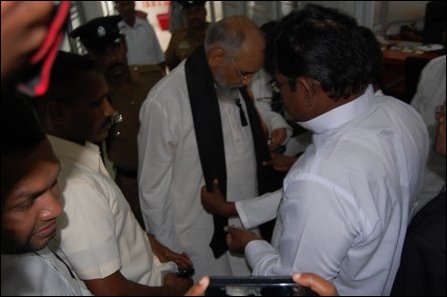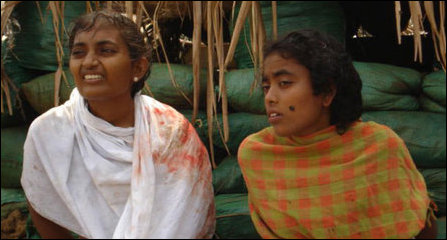[TamilNet, Tuesday, 20 May 2014, 17:17 GMT]Tamils should make their position foolproof said Gajendrakumar
Ponnambalam in an exclusive interview to TamilNet on 17 May in London.
The problem the Tamils face is two fold. The first is geopolitics and
the International Community's reasons for not wanting to recognise
Tamils nationhood and sovereignty. The second is our own problem, where
we have a party that claims to be the democratic representatives of
Tamils, but deliberately chooses not to put forward positions that make
Tamil sovereignty the fundamental basis for any political discourse.
Giving a brief account on continuing oppression and militarization of
the Tamil homeland and talking about manipulation of Tamil political
opinion by international powers both in the island and in the diaspora,
Mr Gajendrakumar called for a stronger network between Tamil Nadu and
the Eezham Tamils to prevent such deviations.There
is no democracy in the ranks and files of the TNA. There are a few
individuals being backed by certain powers who run the affairs. In the
diaspora also there are organisations that are not answerable to the
masses, being propped up in post-2009. There are elections held in the
homeland, but the TNA is not democratic. In the diaspora there are no
elections to have the masses connected to the organisations that do the
politics, the TNPF leader said.
The people should come forward to create a situation to force the TNA to change its current course, he said.
“No
solution that does not recognize our own sovereignty and our own
nationhood will we agree to,” TNPF leader Gajendrakumar Ponnambalam
said, adding that recognition of Tamil sovereignty and nationhood was
the basis on which any solution can be found.
Criticizing the
weakness of the recent UNHRC resolution in Geneva, Mr. Ponnambalam said
that the ground reality in the homeland was getting worse. Oppression
and persecution intensified, as have land-grabs and militarization and
Sinhalicisation.
The ban of diaspora groups also affects
homeland, because it has an impact on the remittance that they send to
people in the homeland.
The Sri Lankan military is deployed to
aid Sinhalicisation and that geopolitical reasons warrant
militarization, he said, referring to Sri Lanka’s increased tilt towards
China. Likewise, Sinhala nationalist agenda is also a primary cause to
the accelerated structural genocide against the nation of Eezham Tamils.
“This
particular government has taken Sri Lankan foreign policy into a
different direction. It is very clearly taking on a very pro-Chinese
tilt” he said, adding that this has caused concern in India, the USA and
in the general West.
When asked about his opinion on how along
with Beijing, New Delhi and Washington and international organizations
that work for these Establishments refuse to accept the historical,
earned and remedial sovereignty of the Eezham Tamil nation, he said “The
Tamil people are very clear that it is through the recognition of the
Tamil nation’s distinct sovereignty that any solution could be found...
for their very existence that is fundamental.”
The problem was
two-fold, he continued. One was geopolitics and the international
community’s own reasons for not wanting to recognize it. Second was our
own fault, he opined, referring to the TNA, who deliberately do not put
Tamil sovereignty as their fundamental basis for the political
discourse.
When questioned that whether this was not the same
problem among some diaspora organizations who, despite having their
freedom of expression, were not willing to place Tamil sovereignty as
the centre of their discussion, Mr. Ponnambalam said: “I see what is
happening in the disapora much the same way as what is happening in the
homeland. You have the people who are very clear about what they want.
And you have an organization that goes before people saying exactly what
they want to hear, gets their vote and does something else.”
In
the diaspora, he continued, organization with no mass support which
emerged post-2009, had been propped up and heavily promoted by their
governments.
He called for Tamil people to be more vigilant, as
this would be the only check against international powers that would use
contradictions within the Tamil community for their own purposes.
“If
you take Geneva, if you take any other forum, when the Tamil issue is
the justification for ‘Sri Lanka’ being discussed, but at the end of the
day the Tamils actually have nothing there.”
“Our party has been
very clear that we need to build a close rapport with Tamil Nadu. I
think our biggest strength is Tamil Nadu.”
He drew a contrast with the TNA who would not work with Tamil Nadu and would work only with New Delhi.
If
a good working relationship between Tamil Nadu, the diaspora and the
homeland could be created, it would check those forces who are trying to
manipulate Tamil opinion, he said.
When asked whether he was
willing to give a practical leadership to the TNA, he was of the opinion
that it was almost impossible to have an open dialogue and debate with
them.
“Very unfortunately, the TNA is not a political party that
is democratic. The party consists of certain key individuals who are
backed by very strong, powerful countries and essentially do the bidding
of those powers that be.”
Talking about undemocratic tendencies
in the TNA, referring to the nomination TNA’s NPC CM Wigneswaran, he
said that only Sumanthiran and Sampanthan had proposed his name, whereas
the other coalition parties actually supported Mavai Senathirajah.
IF
TNA has to be brought back on track, he said: “There has to be an
alternate leadership that is created, that can actually stand for the
truth, that exposes the TNA when it cheats the people, to a point where
we become strong enough that the TNA’s own existence and its own popular
support base becomes called into question.”
He also talked about
how the 6th Amendment to the Sri Lankan unitary constitution prevented
people from talking about the creation of a separate Tamil Eelam state.
He
explained that in the limited political space available in island, his
party was uncompromising on the fundamentals of nationhood and
sovereignty.



























